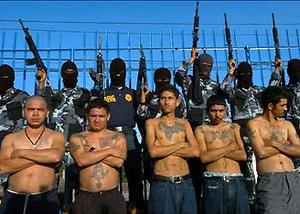Border securityMexican mayors: Returning criminal Mexicans to border towns increases violence
A coalition of Mexican mayors say the United States is contributing to the increase in violence in Mexican border towns by busing repatriated Mexicans who committed crimes in the United States to these border towns — where they join the ranks of the drug cartels — rather than drive or fly them back to their home towns

Captured drug cartel soldiers // Source: blogspot.com
A coalition of Mexican mayors has asked the United States to stop deporting illegal immigrants who have been convicted of serious crimes in the United States to Mexican border cities, saying the deportations are contributing to Mexican border violence.
The request was made at a recent San Diego conference in which the mayors of four Mexican border cities and one U.S. mayor, San Diego Mayor Jerry Sanders, gathered to discuss cross-border issues. Fox News Diane Macedo reports that Ciudad Juarez Mayor Jose Reyes blamed U.S. deportation policy for contributing to his city’s violence, saying that of the 80,000 people deported to Juarez in the past three years, 28,000 had U.S. criminal records — including 7,000 convicted rapists and 2,000 convicted murderers.
Those criminal deportees, he said, have contributed to the violence in Juarez, which has reported more than 2,200 murders this year. Reyes and the other Mexican mayors said that when the United States deports criminals back to Mexico, it should fly them to their hometowns, not just bus them to the border.
Critics in America say the Mexican lawmakers are simply trying to pass the buck to the United States and its taxpayers. They say the Mexicans should take responsibility for their criminals, who are putting both Mexican and American lives in danger.
Macedo reports that U.S. Immigration and Customs Enforcement transports a majority of Mexican criminal aliens back to Mexico on buses. Since they are often held in U.S. detention centers near the border prior to deportation, busing them to Mexican border cities is much less expensive than flying them to the interior of the country.
Those convicted of crimes in the United States are required first to fulfill “any sentence imposed by the U.S. courts,” ICE spokeswoman Virginia Kice told FoxNews.com.
She said all of the deportees are then inspected by Mexican immigration authorities when they arrive in Mexico, and if they are wanted for crimes in Mexico, they are also met by representatives from the Mexican Attorney General’s Office.
If they do not have charges pending against them in Mexico, they are free men and women once they cross the border regardless of what they have done in the United States.
Despite that, ICE says it recognizes the threat posed by Mexico’s cartel-related crime and has been working closely with Mexican authorities to address it.
“Earlier this year, ICE suspended the removal of Mexican nationals with criminal records to Ciudad Juarez,” Kice said. “…In addition to dedicating unprecedented manpower, technology and infrastructure resources to the border, ICE has also collaborated with Mexico to adapt its removal procedures in response to safety considerations.”
Critics of the Mexican lawmakers say the United States is prosecuting the criminals in question, and if Mexico wants to keep them out of its border towns, then it should be up to Mexico to lock them up or transport them elsewhere.
“It’s almost perverse that foreign officials would blame us for sending their criminals back to their country. Sovereignty entails responsibility. This country needs to take responsibility for its own criminals, and other countries — Mexico included — need to take responsibility for their own criminals and deal with them,” Ira Mehlman, spokesman for the Federation for American Immigration Reform, told FoxNews.com.
